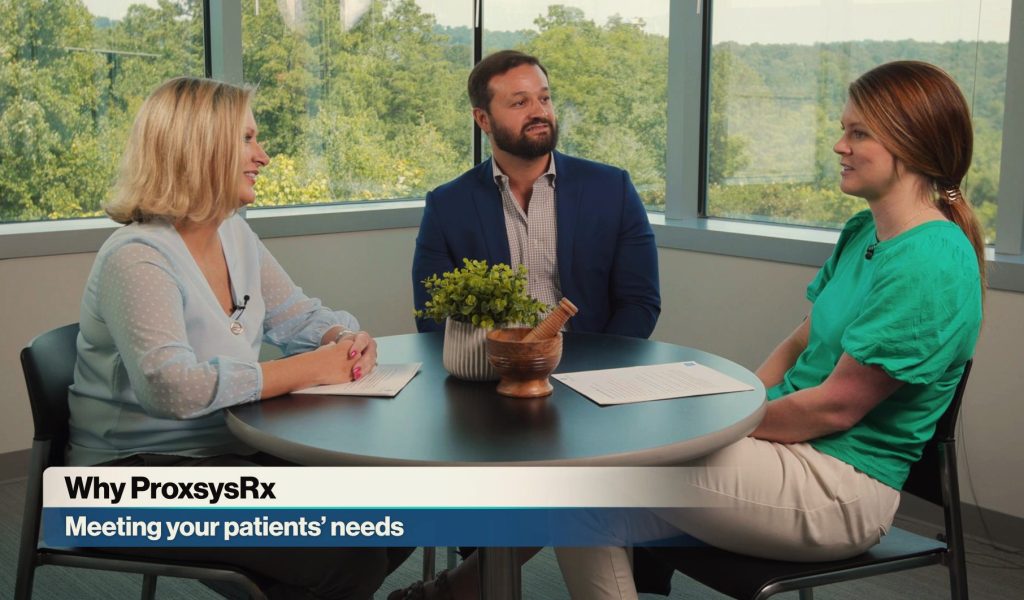
An onsite specialty pharmacy offers enormous potential to positively impact your 340B hospital’s mission in the community.
It enables your health system to provide the best possible care to your sickest patients.
And it yields income you can use to support, expand and improve overall patient services. Some entities generate as much as 600% in 340B revenue from specialty drugs as they do from traditional retail prescriptions.
How much could a specialty pharmacy mean to your health system and its patients?
While opening an onsite specialty pharmacy is extremely challenging, ProxsysRx has developed a proven process for meeting those challenges.
Owning a specialty pharmacy starts with optimizing your 340B program.
URAC Accredited
The ProxsysRx specialty pharmacy team is accredited by URAC, the medical profession’s gold standard for third-party validation of high-quality health care.
ProxsysRx is the only accredited company that offers hospitals a comprehensive range of consultative and hands-on pharmacy-related support services.
The single greatest benefit URAC’s validation offers your health system is a significant reduction in the calendar time, and in the personnel time-investment, required to earn the accreditation you need to own a successful specialty pharmacy.
ProxsysRx offers health systems a financial glide path to help fund their specialty pharmacies, setting-aside select 340B prescription revenue and the additional incomes we generate managing and/or owning retail pharmacies on their campuses.
Learn how to unlock revenue potential throughout the continuum of care.
If you’ve never considered the potential impact a 340B program could have on your health system, Click Here to access ProxsysRx’s ROI calculator.
ProxsysRx recently convened an in-depth roundtable discussion, outlining how eligible health systems successfully manage and operate onsite specialty pharmacies.
What can you do to ensure your specialty pharmacy’s success?
If you choose ProxsysRx to support your health system’s mission, we only pay ourselves from the revenue and savings we generate on your behalf.
We take-on all the risk, so you’re never exposed to even the potential for loss.
To learn more, schedule a preliminary conversation today!

Why Your 340B Hospital Should Have A Specialty Pharmacy
The number of specialty medications is skyrocketing, as chronic illnesses become increasingly common in the United States. Between 2020 and 2030, the number of Americans with chronic medical conditions will grow by a projected 14 million people. That’s why (according to some online reports) nearly 80% of new drug introductions are now specialty medications.
Improved 340B Patient Outcomes. Increased Hospital Incomes.
Improving your ability to care for your health system’s sickest patients is the ultimate benefit of an onsite specialty pharmacy. From a financial perspective, an onsite specialty pharmacy offers your 340B hospital significant potential for increasing its 340B savings — and for passing-along those savings to patients in need.
By some estimates, nearly 90% of all large hospitals already operate on-campus specialty pharmacies. All of which is why we believe every 340B health system looking to optimize pharmacy revenue and patient outcomes needs its own specialty pharmacy.
Streamlining Your Hospital’s 340B Patient Care
Onsite 340B specialty pharmacies are uniquely equipped to dispense medications tailored to specific medical conditions, from chronic diseases to rare disorders. Your specialty pharmacists can work alongside your health system’s providers, to ensure that their patients get treatment plans and drug therapies personalized to their specific disorders. This coordinated approach also helps your care teams minimize the risk of 340B specialty medication errors.
Ensuring Better 340B Medication Adherence
It’s no secret that medication non-adherence is the leading cause of costly, and unnecessary, patient readmissions. An onsite specialty pharmacy can help your 340B health system significantly improve medication adherence among patients at the greatest risk of readmission — particularly if you also have an onsite 340B retail pharmacy.
With both a retail and specialty pharmacy, your 340B patients can get all their prescriptions filled on-site — or delivered directly to their homes from your pharmacies. At the same time, the ability to work directly with specialty pharmacists within their health systems makes it much easier for your providers to effectively serve their patients.
Finally, by virtue of their ability to engage patients in one-on-one counseling, your onsite specialty pharmacists can provide the kind of personalized support and education that incentivizes patients, and their caregivers, to take a much more active role in managing their health.
Expanding Patient Access To 340B Specialty Medications
The number TWO reason for patient medication-protocol noncompliance is the limited availability of those prescriptions. By enabling your hospital to procure specialty drugs at discounted prices, your onsite 340B specialty pharmacy can reduce the patient-compliance barriers of both cost and availability. This ensures that patients with limited financial resources can receive the treatments they need, thereby ensuring greater health equity in your 340B hospital’s community.
Optimizing 340B Prescription Savings And Revenue
Some 340B covered entities generate as much as six times the 340B revenue from their specialty prescriptions as they do from their retail pharmacy prescriptions. Not only do these increased revenues support your health system’s financial stability, they give you additional revenue you can invest in expanding your healthcare services and improving your ability serve your community.
Supporting Better Patient Satisfaction Rates
There are several ways that an onsite specialty pharmacy can increase your health system’s patient satisfaction ratings, including:
- Enhancing levels of care and attention by reducing wait times, and tailoring medication services.
- Improving patients’ confidence in their treatment plans, and in your healthcare system, by affording them access to specialty medications at reduced costs.
Participating In Specialty Medication Research. Supporting Innovation.
With its access to a broad spectrum of specialty drugs and patient populations, your specialty pharmacy can participate in drug trials — contributing to the advancement of medical knowledge, and the development of new treatment options. At the same time, collaborating in research studies with pharmaceutical companies is an excellent way to improve your health system’s relationships with 340B drug manufacturers.
Using Data Analytics To Improve 340B Patient Outcomes
340B hospital specialty pharmacies collect a wealth of valuable patient data. Data your pharmacists can analyze and use to monitor patient medication adherence, identity and prevent possible drug interactions, and adjust treatments for greater efficacy. This evidence-based approach enhances your 340B hospital’s quality of care, benefiting your patients and your health system.

Starting A 340B Specialty Pharmacy: What Does The Process Look Like?
The process of opening an onsite specialty pharmacy is complicated and challenging. It involves a significant amount of effort just to get your 340B health system access to purchase specialty drugs, and then get your specialty pharmacy “In Network” with PBMs. Below you’ll find an overview of the proven process ProxsysRx has developed to meet that challenge.
A specialty pharmacy’s success starts with 340B-program optimization
(For an in-depth guide to optimizing 340B program savings and revenue, Click Here. Or feel free to reach-out to us for a no-obligation consult.)
The first step in planning a successful onsite specialty pharmacy (which is also the most important step) is to ensure that the clinics in your health system writing specialty prescriptions are 1) 340B eligible, and 2) registered with your hospital’s 340B program.
Establishing your hospital’s 340B specialty network
It goes without saying that your specialty pharmacy’s product mix and services should be tailored to your patient populations’ needs. Toward that end, you should consider the following:
Offering 340B therapies suited to your patients’ needs
Make absolutely certain that your 340B specialty pharmacy product mix accommodates the therapies your health system offers the patients you serve.
Knowing the rule sets for 340B qualification
- Work closely with your third-party administrator (TPA) to ensure that you, and they, have both accurately identified your specialty-medication prescribers and providers.
- Prior authorizations and medical benefit eligibility checks for 340B specialty prescriptions generally have longer timelines, so you’ll want to extend your eligible-date windows for them.
- Educate your prescribers on the specialty pharmacy’s defined workflows and charting requirements, to ensure that they’re adhering to those workflows and requirements.
- Prescriptions can be sent to your specialty pharmacy via fax, EMR and pharmacy hub. Be sure that your 340B qualifications account for all of those delivery-channels.
Adjusting your 340B workflows for specialty-related complexity
Your specialty pharmacy’s custom rulesets result in greater workflow complexity. Because of that, it is much easier for 340B specialty-prescription claims to fall through the cracks. The best way to identify those situations is to create partial matching rules (IE: By therapy or prescriber), and then thoroughly review those rules for 340B qualification.
Keeping current on savings rates for 340B replenishment
It’s critically important that your health system routinely audits 340B catalog pricing. Why? Up to 10% of all 340B specialty catalog pricing, by some estimates, is inaccurate at any given time — and you want ensure that your pharmacy maintains current 340B pricing for specialty drugs at all times.
Launching a specialty pharmacy, overview
Reaching-out to the PBMs in your area for inclusion
Your specialty pharmacy’s success involves more than just well-managed internal operations. When you choose ProxsysRx as your 340B specialty pharmacy partner, we go in-network to secure approval from all the major insurers in your area, and from the PBMs who cover your patients. We also seek 340B access from the drug manufacturers for the drugs your providers prescribe — often overcoming even the most extreme manufacturer restrictions on 340B medications.
Overcoming manufacturer restrictions on 340B specialty medications
When 340B hospitals are forced, by manufacturer restrictions, to select a single pharmacy for 340B pricing, there is a workaround — assuming it’s legal in your state. If so, your hospital can operate its specialty pharmacy alongside your retail pharmacy — provided: 1) the two pharmacies’ operations are physically in separate spaces, 2) each works under its own Pharmacist-In-Charge), and 3) there is no overlap between the two pharmacies in procedures, functions or personnel.
Stocking your specialty pharmacy
You’ll probably need to spend about $1 million stocking your specialty pharmacy with startup inventory, once your health system has gained access to buy specialty meds.
Staffing
Your specialty pharmacy will require you to hire at least one Certified Specialty Pharmacist.
Operations
You should consider a Soft Opening for your specialty pharmacy, to give your health system —and your 340B program — time align all of the necessary practices, policies and procedures for accreditation.

Here’s How Your Hospital Can Pay For Its Own 340B Specialty Pharmacy
ProxsysRx manages 340B programs for seventeen health systems, and has generated more than $500 million in 340B savings and revenue since late 2019. In the process, we’ve developed tactics for overcoming many of the toughest manufacturer restrictions.
We help 340B hospitals unlock pharmacy’s potential for improving patient outcomes, and health system incomes. By optimizing revenues from both their 340B programs and their retail pharmacies, we can then help them implement strategies to use those savings and revenues to help fund onsite specialty pharmacies. With every hospital we serve, our ultimate goal is for the health system to pay nothing out-of-pocket in building its own specialty pharmacy.
To fund a specialty pharmacy, optimize your 340B program first.
(Click Here to read our in-depth guide to optimizing your health system’s 340B program revenue. You are also welcome to reach-out to us for a no-obligation consult.)
Set-aside a portion of your 340B program’s savings.
For your 340B retail-prescription revenue, try setting-aside a portion of savings from your most profitable 340B drugs — such as “soft specialty” medications like Humira — to help cover your upfront costs. Implementing this strategy, you can slowly and methodically build-out your specialty pharmacy capabilities, without having to dedicate a large capital expenditure from your health system’s budget.
You can also use your hospital’s retail pharmacy revenue.
If your retail pharmacy is well-managed, it should be generating substantial profits for your health system. ProxsysRx owns (or manages) on-campus retail pharmacies for 340B hospitals across the country. Those pharmacies generate an average of $750 to $1000 in per-bed net profit every month. Which means that a 200-bed hospital can expect to generate $1.8M to $2.4M in annual net profit from its onsite retail pharmacy.
If you don’t have a Meds To Beds program, get one.
There is no better way to capture patient prescriptions (before they leave your care), while providing an always-welcomed service, than bedside prescription delivery. ProxsysRx also manages Meds To Beds programs for hospitals across the country. In a single health Mississippi system, our Meds To Beds team filled over 18,000 discharge prescriptions in its first 12 months. That program resulted in pharmacy revenues increasing by 125% and patient readmissions decreasing by 79%.

Best Practices For A Successful 340B Specialty Pharmacy
ProxsysRx recently conducted an in-depth roundtable discussion, among our specialty pharmacy team leaders, which outlines how eligible health systems can ensure that their onsite specialty pharmacies are successful.
If you’d like to watch videos of that discussion, organized by topic, Click Here. You’ll also find a written, curated transcript of the discussion here.
Build strong relationships between your pharmacists and your providers.
It’s absolutely critical that the specialty pharmacists you hire are capable of building solid working relationships with your clinic teams, to ensure an integrated effort among all your teams.
Ask drug manufacturers for research-partnership opportunities.
Introducing a new specialty drug requires a wealth of research, before and after the drug is on the market. Many manufacturers seek the inclusion of active patients in their medication research. After new drugs become available to the market, manufacturers need evidence that it improves real patient outcomes. Your specialty pharmacy should partner with interested manufacturers to participate in research, and provide them that data.
Be sure you know accreditation requirements from the outset.
Specialty pharmacy accreditation standards are extremely stringent, and detailed, covering everything from certified pharmacists to adequate space and refrigeration equipment — not to mention the standards you have to meet, in order to get access to drugs. Make sure your hospital can accommodate the necessary physical and personnel resources before you commit.
Be aware of the prescriptions you can fill before you're accredited.
Accreditation generally takes anywhere from six to twelve months. However, there are some 340B prescriptions that you can start filling Day One. Our team will help your hospital identify those prescriptions you can fill, as we work — together — towards your accreditation. At the same time, we’ll manage and oversee the process of getting your specialty pharmacy into the PBM networks you will need to fill your 340B specialty prescriptions.
Reporting guidelines involve processes you’ll need to uphold.
Meeting reporting guidelines is particularly important when you’re filling prescriptions before you’re accredited, so you need to establish your processes very early-on. Since you’ll be filling comparatively fewer prescriptions while you’re getting in the PBM networks, you’ll have time to perfect your processes, procedures and policies before you’re accredited.
Learn the phone-call metrics you’ll need to keep.
Accredited 340B specialty pharmacies are required to maintain specific metrics for phone calls. For starters, you’ll need to have someone in your pharmacy who can answer phone calls, promptly, whenever it’s open. ProxsysRx specialty pharmacies strive to answer all calls within 30 seconds. It’s our goal to give patients access, at all times, to professionals who can answer their questions — and ensure that they're receiving appropriate care.
Understand the monitoring and assessment data you’ll need to report.
PBMs and accrediting bodies also require specialty pharmacies to track, measure and report patient monitoring and clinical assessments — in addition to the phone-call metrics they keep.
Supporting your providers with clinical assessments
Your specialty pharmacists should be on-hand to help conduct initial assessments for all specialty-medication patients. They’ll help your providers determine, among other things, what medications their patients are on, and any potential drug interactions that might pose a risk. Once a patient’s medication regimen is prescribed, your pharmacists will offer your providers ongoing support — ensuring that prescription protocols are appropriate, up to date, and accurate for each patient’s disease state.
Providing continuous, ongoing monitoring and reporting
Post-discharge monitoring for all specialty-prescription patients should be ongoing, as long as patients are on their medications. At the very least, your specialty pharmacists should monitor patients monthly — discussing, with them, everything from medication side effects and other issues to any trouble they might have storing their medication. They should then report whatever they’ve learned back to the accrediting bodies, ensuring there is always documentation that you’re providing the appropriate care.
Ensuring patient satisfaction with your specialty pharmacy’s support
Another way accrediting bodies ensure that you’re upholding the standards set for specialty pharmacies is through patient satisfaction surveys, which must be conducted by independent third parties. Your specialty pharmacists should also make sure that they, and your providers, do what it takes to ensure that your patients know you care about their outcomes.
Following strict protocols for shipping and packaging
Nearly all of the medications dispensed by specialty pharmacies are delivered to patient’s homes. Many medications need to be either refrigerated or frozen, while some must be stored at room temperature. That’s why it’s critical that specialty pharmacies implement appropriate shipping and packaging protocols for every medication they dispense. ProxsysRx can help you tap-into a network of proven specialty vendors we have already vetted. We also have processes for vetting the capabilities of any new vendors you’d like to use.
Integrating your specialty pharmacy with your health system’s technology
Your 340B specialty pharmacy will need a software system that can pull all the data, create the necessary outlooks and outputs, and produce the reporting you need to send; both to the accreditation boards, and to the PBMs — so you can you can bill for patients’ care when you get In Network for their PBM(s). There are also a number of metrics you’ll need to report to your PBMs, and the manufacturers, in order to get access to their medications. ProxsysRx offers a proprietary software platform to the health systems we partner-with in building specialty pharmacies.
Integrating your specialty pharmacy into your 340B program
In many ways, the success you have integrating your specialty pharmacy with your 340B program will determine its impact on your health system. Which is why your 340B team and your specialty team need to be on the same page, when it comes to following the best practices for working within your hospital’s 340B program. Both teams need to know how to optimize your clinics’ opportunities to affordably fill your patients’ 340B prescriptions with both of your hospital’s pharmacies (retail and specialty).
As we’ve noted earlier on this page, a well-managed 340B program — particularly one that is integrated with your health system’s retail pharmacy — can generate millions in annual revenue while your specialty pharmacy is under development.
Know how to avoid negative reimbursements.
One of the most common ways negative reimbursements are caused is by neglecting the 340B status of a particular dispense. This is particularly true for DSH hospitals, which are subject to what’s known as the GPO Prohibition. When that happens, and a specific drug doesn't qualify, a specialty pharmacy is required to purchase it at the Wholesale Acquisition Cost (WAC), rather than on the 340B account.
The importance of performing prior authorizations
Many PBMs will not pay for prescriptions from the moment your specialty pharmacy is launched. In order to get your drugs covered, there are a number of barriers you have to overcome with payors. The copay for even some covered 340B specialty drugs can be very high — sometimes in the thousands of dollars.
All of which is why it’s so important that your specialty pharmacists know how to perform prior authorizations. Before any patient engages with your specialty pharmacy, your pharmacists dispensing their drugs should ensure that they’re able to fill his or her prescriptions on the 340B account, and that the remaining patient copay is a cost they can bear.
Securing specialty drug copay assistance for patients in need
Most 340B patients cannot afford high copays, which is why you should be aware of the many available copay assistance options. Some manufacturers offer assistance programs. Other assistance programs include 340B pricing options and charity care. Therein lies another benefit of having pharmacists working alongside your clinics: Ideally, the pharmacists in those clinics will know how to secure copay assistance before patients in need engage with your specialty pharmacy.
Creating a strong working relationship between your retail & specialty pharmacies
Many of your hospital’s patients will need prescriptions filled by both of your pharmacies — retail and specialty. Having both pharmacies onsite is your insurance that those patients are able to fill all their prescriptions, with no delays. Both pharmacy teams should know, at all times, what the other is doing with those patients.
Addressing patient questions about their specialty medications
While it’s true that your specialty pharmacy patients can get some answers from your retail pharmacists, they should be connected with a clinical pharmacist familiar with their disease states for questions regarding high-complexity specialty meds. Also, before each refill, your clinical pharmacists should speak with patients, not only to answer any questions, but to check for medication effectiveness and side effects as well.
ProxsysRx is here to help, if you have questions.
For more information on how to build and fund a successful specialty pharmacy, or for more information on any of the pharmacy-support services we offer, contact Howard Hall. C: 214.808.2700 | howard.hall@proxsysrx.com

